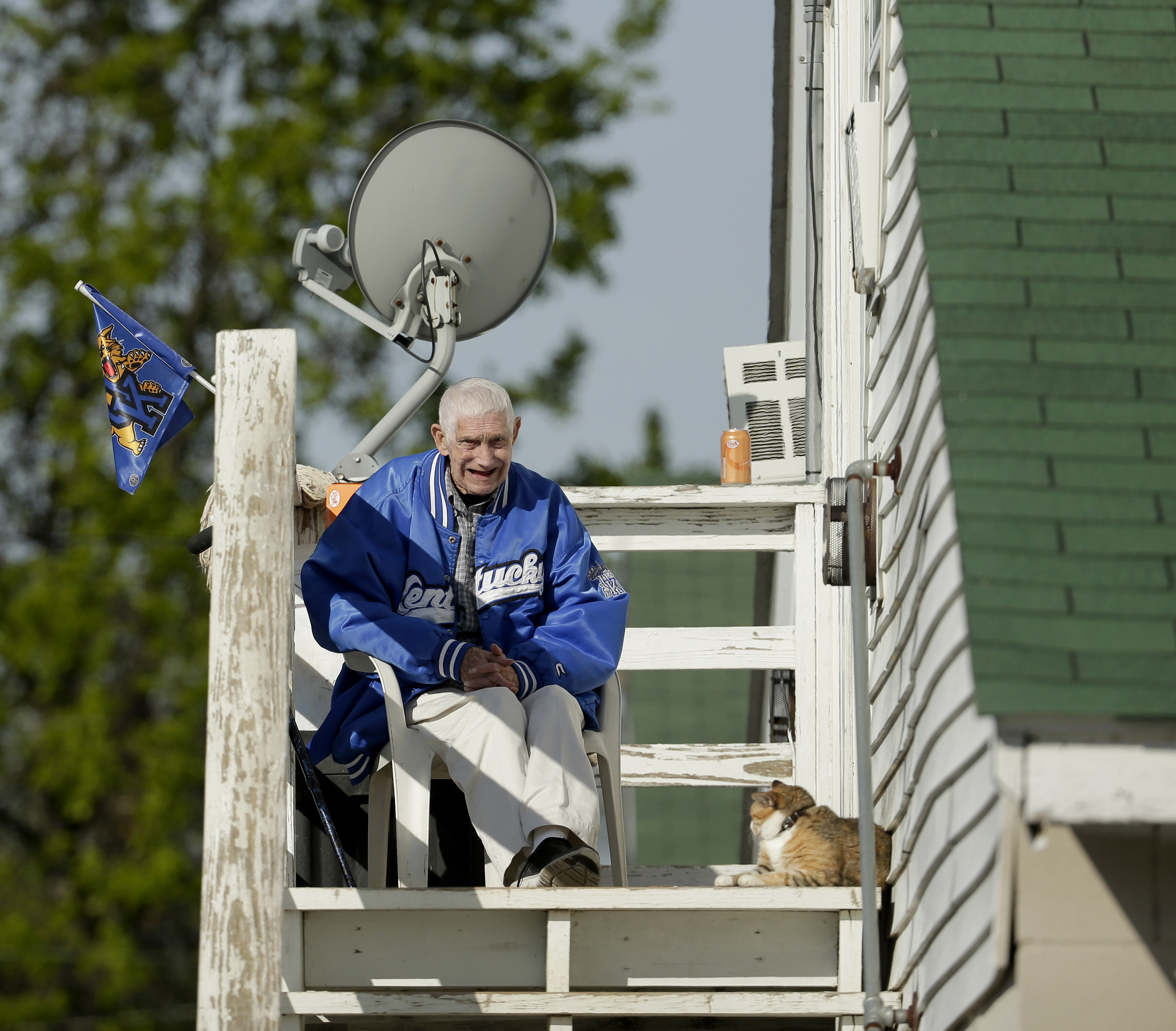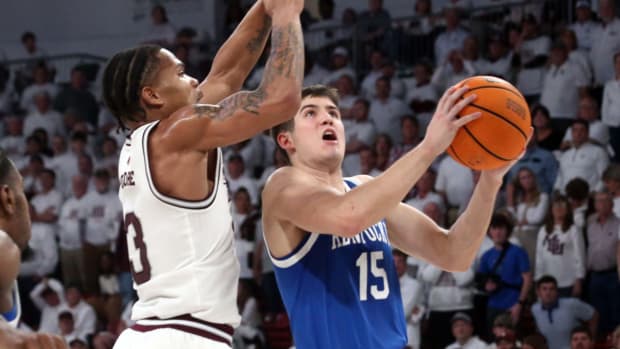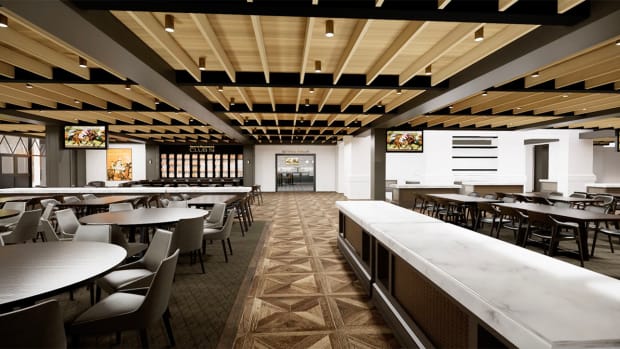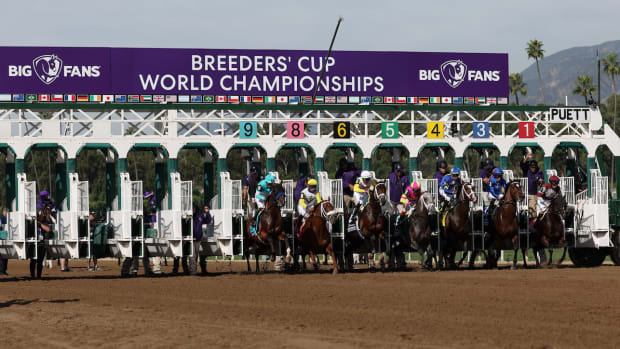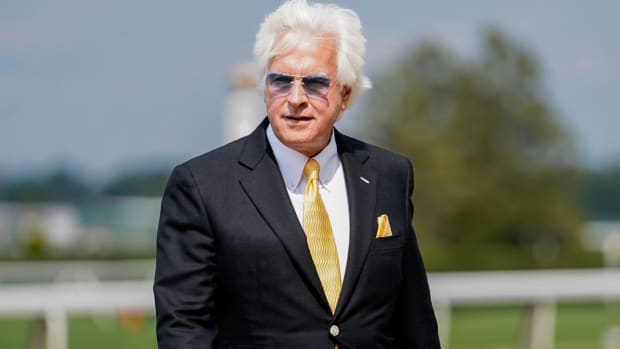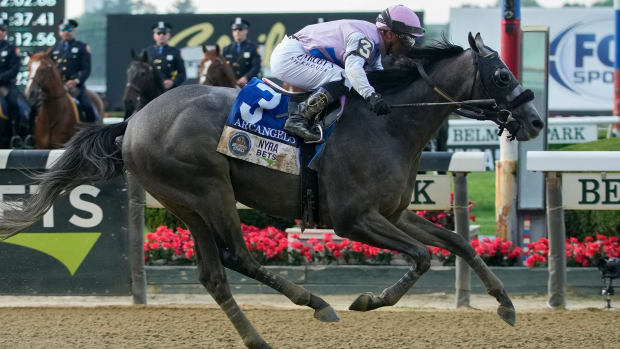Churchill's backside takes care of horses and old horsemen
LOUISVILLE, Ky. (AP) The white-haired horseman still sleeps above the stable.
When the sun comes up, 87-year-old Richard Miller shuffles from his little room above barn No. 11 on the backside of Churchill Downs. He plops into a plastic chair on the balcony and waves to the stable hands who do the job he did for six decades - the one he would still be doing if his body would let him.
''I once walked a horse worth a million dollars,'' he likes to brag. ''I'd rather be down there now walking the horses.''
But now, Miller is a ward of the backside. The other grooms help him take a bath, trim his hair and tie his shoes. He lives in the horse barn because he's always lived in a horse barn. He can't imagine living anyplace else.
''He's an old racetracker, true and tough,'' said Greg Foley, the trainer for whom he worked for 30 years. ''So he's going to stay here with us as long as we can take care of him.''
Work days on the backside begin before dawn, pay is skimpy and attire trends toward jeans and T-shirts, a world away from the high-roller suits and plumed hats on Millionaire's Row for the Kentucky Derby.
For the 160,000 fans packed into the track on Derby Day, the green-shingled barns of the backside are scenery. And the 1,000 workers who toil in obscurity inside of them don't expect the visitors to give them much thought.
''We're indispensable; they can't do this without us,'' said Mike Wells, who has spent the last nine years as a hot walker, offering the horses soothing words as he leads them around the stable to cool off after workouts.
It's not always as serene as it sounds: He's been bitten, kicked, stepped on and slammed into walls by powerful horses.
They feed, exercise, bathe the thoroughbreds, part of a morning ritual that runs like clockwork. Most of them live there, too, crammed into dorms, small apartments and tack rooms.
It is, depending on who's describing it, a little city or a giant family. They have a chapel, a school and an annual Easter egg hunt.
Ken Boehm, the track's chaplain, says Miller's life at the Greg Foley Racing Stables is evidence that the backside isn't filled with roughnecks, gamblers and boozers.
It is a community of workers, from dozens of nations, he said. They take care of the horses, and they take care of their own. And Miller is one of their own.
Like many others, the Foley crew spends the winters at the racetrack in New Orleans and returns to Churchill each fall. This year, as the workers packed up to come home, they loaded Miller's recliner into a stall of the horse van. Then they sat him in it, put a blanket over him and he slept the whole way home to his tack room, maybe 100 square feet, with a twin bed, his recliner, a dresser with a small flat-screen TV on top and a portable commode.
He gets Social Security benefits, but he tries to withdraw as little as he can, he said. He only bets a few dollars every now and then, when he's really fallen for a horse.
Twice a week they go for lunch at Wagner's Pharmacy, the fabled diner across from the racetrack. He always orders his favorite, biscuits and gravy. Everybody knows him, said cashier Carolyn Beacher.
As Miller sits on the barn's balcony petting his 13-year-old cat Prince and watching backside workers bustle by, he lights a Kool menthol.
''You know those are gonna kill you, old buddy,'' one passer-by shouted up at him. The old man threw his head back and howled.
Sometimes Miller says he's 78, sometimes 81. The crew jokes the he's fibbing to fool young ladies. But they know he really just can't remember.
''His mind is slipping,'' Foley said.
Miller said he was born in 1927 and raised in Evansville, Indiana, by a single mother who worked at a refrigerator factory. He never went to high school.
Instead, he got his first job on the backside of a racetrack when he was 15 years old, he said. He's lived on one ever since.
He joined Foley's crew in the early 1980s.
Foley trained a prize horse named Champali, who won a dozen races and made $1,073,794. In 2004, at the height of Champali's career, Miller was the only worker Foley trusted to walk him.
Miller fell and broke his hip soon after that, and the crew worried it might be the end of his time on the backside.
But Miller recovered from the surgery and walked horses for another seven years. He decided it was time to retire about three years ago when he just couldn't keep up anymore.
On Derby day, they'll sit him outside their barn and task him with running off anybody who doesn't belong. He likes to feel like he's contributing something.
But Foley dreads that a day will come when Miller needs more than his crew can give. He suspects Miller won't last long once they take him off the track.
